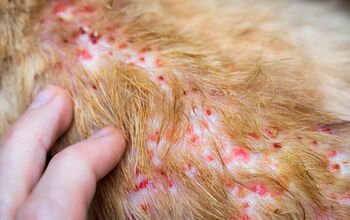The 411 On Colitis In Dogs

Your dog is part of your family – your best friend – so you want to do everything in your power to keep him healthy. While you cannot necessarily protect your dog against each and every disease, you can educate yourself about the diseases he might be exposed to so that you can take quick action to get him the treatment he needs. One disease that can be serious for dogs is colitis – a condition affecting the colon, or large intestine.
What is Colitis in Dogs?
The term colitis refers to the inflammation of the small intestine, or colon. This condition is responsible for about half of all cases of chronic diarrhea in dogs and it is frequently mistaken for constipation. Colitis typically results in frequent low-volume defecation and, in many cases, the stools are loose or liquid. Fortunately, dogs that are treated promptly and appropriately typically make a full recovery. If the condition is not treated, however, the condition can become chronic and may result in painful defecation and dehydration.
Related: What Are The Benefits Of Coconut Oil For Dogs?
Cause and Symptoms of Colitis in Dogs
There are several potential causes for colitis and it may vary from one case to another. A common cause of colitis in dogs is stress or simply exposure to contaminated food. Infections caused by various bacteria or parasites are also a common cause of colitis. Salmonella, Clostridium, and E. coli are common culprits for infections leading to colitis as are the parasites Giardia, Cryptosporidium and whipworms. In cases where bacteria or parasites are responsible for the infection, it is often the result of the dog’s immune system already being weakened by illness, stress, or injury.
The symptoms of colitis in dogs typically include painful defecation, prolonged squatting or straining during defecation, gas, small stools, and blood or mucus in the stools. Unfortunately, these symptoms are similar to the symptoms of constipation which frequently leads to misdiagnosis in cases of colitis. In most cases, colitis is diagnosed by performing various tests to rule out other conditions such as irritable bowel syndrome, cecal inversion, and colonic tumors. Some common tests for colitis may include rectal examination, fecal exam, cytology, and various blood tests.
Related: DIY Natural Home Remedies For Dogs
Treatment Options
The treatment options for colitis in dogs varies depending on the underlying cause of the condition. For example, if the cause of colitis is irritable bowel syndrome, the treatment involves a high-fiber diet to help solidify the stool. Bacterial causes of colitis, such as Salmonella, Clostridium, and E. coli, may require treatment with antibiotics. Non-specific treatments for colitis may include fasting for 24 to 48 hours in addition to increasing fiber content in the diet and switching to a hypoallergenic diet. When a diagnosis is made and treatment started in a prompt manner, the prognosis for dogs with colitis is generally very good. Stress-related colitis typically resolves itself within 3 to 5 days with proper treatment. If symptoms last for more than seven days after treatment, you may want to take your dog back to the vet to investigate the possibility of an underlying condition.

Kate Barrington is the loving owner of two cats (Bagel and Munchkin) and a noisy herd of guinea pigs. Having grown up with golden retrievers, Kate has a great deal of experience with dogs but labels herself a lover of all pets. Having received a Bachelor's degree in English, Kate has combined her love for pets and her passion for writing to create her own freelance writing business, specializing in the pet niche.
More by Kate Barrington























